Postcards From Africa
Northern Michiganders Work to Improve Life in a Faraway Place
Not all travel is about relaxation and fun. Some people travel for a purpose.
In recent years, people from across northern Michigan have found themselves in Africa to heal the sick, to help the poor obtain access to water, and to oppose the victimization of women. These are some of their stories.
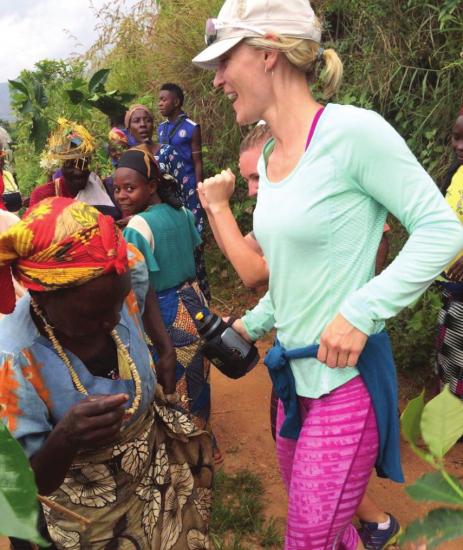
A RUN ACROSS THE CONGO
It’s hard to run a marathon. It’s mind boggling to think of running seven marathons in seven days – but what Meryl Marsh and a group of women did last year is another thing altogether. They ran for a week through a country that has been ravaged by civil war for two decades.
The women ran through an eastern region of the Democratic Republic of Congo on behalf of Traverse City nonprofit On The Ground, in order to bring attention to the plight of women in that country. In two decades, 6 million lives have been lost and countless women have been raped.
Marsh, a Traverse City resident, said the logistics of the run were complicated and safety was a priority.
"Nobody gains anything in putting themselves in a risky situation and then changing the focus of why we were there," Marsh said.
The runners crossed a region that is reemerging as a coffee growing center; it’s also scarred by years of war. Rape is commonplace, used as a tool of insurgency. Rather than resulting in punishment for the perpetrator, it more typically leads to banishment for the victim.
On the Ground runners ran through the region in May 2015 to raise money for a medical center that helps rape victims.
Four pairs of running shoes, thousands of photos and countless memories later, Marsh and the others completed their multi-day run. Marsh said the experience was incredible.
On most days, miles from their destination village, locals greeted the runners, joining them for the last few miles and singing and dancing along the way.
"Every time we would come into a village, the amount of energy and excitement in welcoming us was totally overwhelming every day," she said.
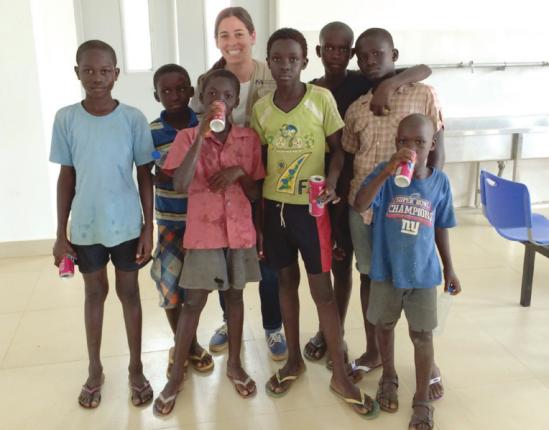
BACK FROM EBOLA
Petoskey native Kelly Suter’s penchant for traveling to dangerous places gained her minor fame that included a feature in Vogue and a segment on 60 Minutes.
Suter worked at an Ebola treatment unit in Liberia through the International Medical Corps (IMC) in 2014 and, a year later, she helped another African country prepare in the event that the disease broke out there. (For more on Suter’s time in Liberia, check out "From The Heart of Ebola" in the Dec. 1, 2014, edition of The Express.)
Today, she is back in the United States where she is earning her master’s degree in bioethics and also working at IMC, prepared to be deployed again whenever disaster strikes. The Express checked in with her via telephone from her office in Washington, D.C.
Northern Express: Were you ever recognized based on the media attention you got in Liberia?
Kelly Suter: My appearance on 60 Minutes was brief. I was wearing scrubs; my hair was slicked back. During that interview, I had literally just come out of the contamination unit, so I probably was a little altered looking from what I normally look like, and that interview was in November and I didn’t get home until the end of February. And the image that they released for nurse.com and Vogue was the one with me with the goggles on. Other than the eyes, you can’t even see anything, so I was never recognized.
Express: The letters home you wrote from Liberia were heartbreaking. You must have been physically and emotionally exhausted when you finished your tour there.
Suter: It was difficult. Every mission I’ve come back from, every disaster I’ve come back from, takes a little bit of time to recover from. Obviously, the Ebola mission was both physically and emotionally difficult and it took a while to recover – probably a good year. It’s not like I was a basket case up until that, but there was a lot of numbness when I just got back, kind of like disbelief in what I saw and what I had done. Thinking about it afterwards, it was like, "˜Did this really happen?’ And then you start working through it and you start talking about it more. I had a number of speaking engagements that kind of forced me to think about it, think through it, kind of tell stories. That actually kind of helped. It took a while.
Express: Tell me about your trip back to Africa in September.
Suter: Guinea Bissau is a very, very small country in West Africa and they never had Ebola, but being such a small country and having very few resources, and being a little bit politically unstable – there was actually no government in power when I was there – there was concern that, if Ebola entered into that country, that it would do quite a number on them. So the whole goal of that was to implement an Ebola prevention program. It involved a lot of training of health care workers. We prepositioned supplies for an Ebola treatment unit so that, if Ebola entered the country, we could, in a very short amount of time, throw together an Ebola treatment unit; we’d have all the supplies and we’d have a full team already trained and ready to go. And then, outside of that, we did a lot of inspection control training, teaching a lot of the basic hygiene methods for hospitals and health care workers – just a lot of prevention measures. I did that for a month.
Express: What do you plan to do with your master’s in bioethics?
Suter: I’ve always been interested in bioethics and, when I say that, I mean I truly, truly believe in the value of each and every human life – that extends from the moment of conception until natural death. And I found that, during disaster response, that a lot of times, especially because they are so emotionally and stressfully charged, that some of those perspectives can become kind of gray. I remember responding to Ebola and having to talk a nurse through the fact that ending a patient’s life early was not Okay. This patient was going to die, they were very near death, and they died, I think, a day later, but walking her through the reasons behind why that wasn’t Okay to end his life earlier, I found that I was lacking some of the technical knowledge I needed to be able to explain that well to her. And I wanted to make sure that, if I ever found myself in that situation again, that I could appropriately respond and help another person see why ending another person’s life is not the same as helping them die with dignity and peace.
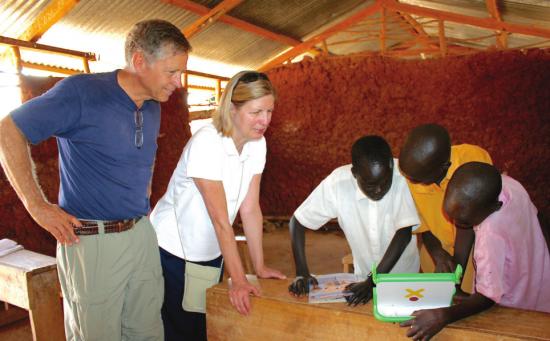
SEEMING DIVINE INTERVENTION IN KENYA
Andy and Olivia Dupont happened to learn that a small village in Kenya needed a water well just as they were looking for a place to drill one. The couple first traveled to Kenya from their Glen Arbor home in 2007. They went via their church to help people infected with HIV until 2009, when they learned of a small village in the region of Pokot that faced a simple, yet intractable, problem: they needed clean drinking water.
"In the very early going, we had a couple from Traverse City approach us, and they were getting married later in life and they didn’t need pots and pans, so they were taking gifts as donations to build a water well and they said, "˜Andy, do you know anyone who needs a water well?’" Andy said.
They raised $4,500 and the Duponts received a $9,000 anonymous gift. That left $6,000 needed. When the Deponts returned to Kenya, they learned that’s exactly what a local church had raised.
"God knew exactly what was needed," Andy said. They’ve spent six weeks in the village every year since then. They teach self-sufficiency and Christianity. They’ve become such fixtures that the residents built them a mud hut, far better accommodations than the tent the couple, who is in their 60s, were used to.
More wells have since been drilled, villagers have learned how to repair and maintain them, and the Duponts have convinced residents to send almost all of their children to school, as a step to end the cycle of illiteracy and poverty that’s plagued the village.
"This new generation coming up, they’re not illiterate, and it’s having a massive impact on their parents," Olivia said.
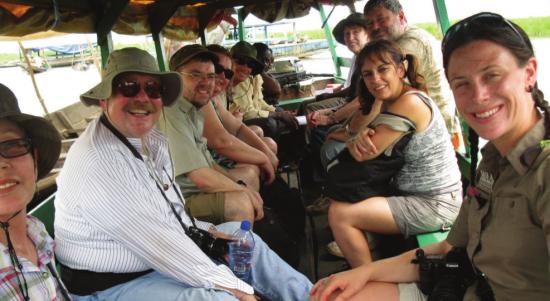
"IN AND OUT OF SOMEWHERE CRAZY"
The folks who sign up for the rugged trips offered by WANT Expeditions are looking for adventure, but owner Jessica Pociask said she hopes the tourists she shepherds to faraway places leave those places better off.
"People in general know that, when they are coming on our trips, that they are there to support the communities that we are visiting, as well as having a vacation," said Pociask, who splits her non-travel time between Washington, D.C. and Traverse City.
In some cases, just the presence of foreign visitors willing to spend money can have a positive impact on an isolated, avoided part of the world.
"I think one of the things that we’ve really prided ourselves on is developing tourism in counties that very few people are visiting," she said.
Pociask recently qualified to be one of the first female guides at a national park in Chad, a country that, until recently, was considered inaccessible. The U.S. State Department advises against travel to Chad.
She believes wildlife tourism in a place like Chad could eventually bring peace and security to the country, while at the same time benefiting the natural environment. If locals understand that wildlife brings tourist money they depend upon, they are less likely to abide poachers.
Should a tour run into political instability somewhere, Pociask has experience with that.
She helped tour groups escape Mali in 2012 and the Central African Republic in 2013.
"When you need to get in and out of somewhere crazy, then you give me a call," she said.
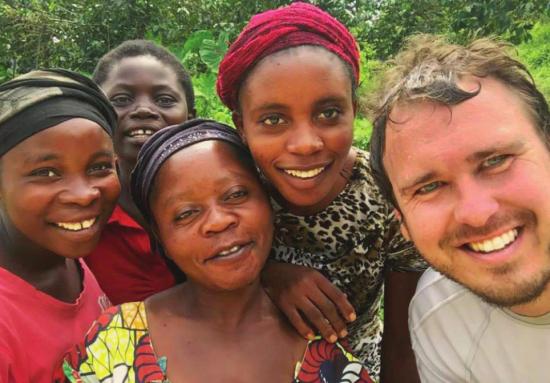
GOING TO THE CONGO FOR COFFEE
Chris Treter gets coffee from some pretty exotic locations. Going to great lengths to get those beans means Treter and his business, Higher Grounds Trading Company, are able to source coffee from the places where it grows best, and help the impoverished people who live in those tropical, high elevation areas.
In the past few years, that’s taken Treter on frequent trips to the Democratic Republic of Congo, a war-torn country in the middle of Africa. The nonprofit On The Ground, which he started with his for-profit business, has helped find sources of drinking water in Chiapis, Mexico; it’s built schools in Ethiopia; and now it’s worked for gender equality in the Congo by helping to start a medical center for women who are victims of rape.
Treter said he’s wanted to work in the Congo for years, but only recently has he been able to get footholds there.
"For the last 30 years, no coffee’s come out of the Congo because of that conflict, and it’s just coming out now," he said. "The biggest challenge there is access; it’s difficult to get into the country."
Once he gets there, despite the lack of other foreign travelers and the civil war that still rages in portions of the country, Treter feels at peace. Part of that has to do with the fact that he knows when and where not to go and because his larger business partners employ security firms that keep everyone safe.
"For me, it’s one of the most relaxing places because that danger isn’t in your face at all times, and the local population is the most resilient, entrepreneurial, active population of any that I’ve ever visited," he said.
Once he is in the country, Treter promotes the coffee industry through micro loans to female growers and by helping the industry develop. Last June, Treter was part of an event he hopes will be considered a turning point in the history of the Congo. The Saveur du Kivu was a coffee competition that brought together Congolese coffee growers and coffee buyers from around the world.
"It was a hundred times bigger a deal to the Congolese than I could have imagined," Treter said.
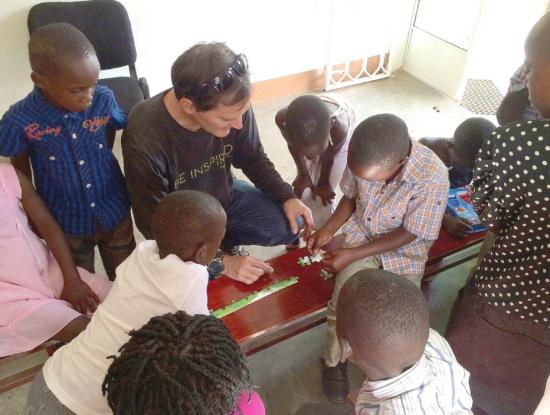
MORE BUG BITES WITH UTOPIA
Wealth manager Paul Sutherland of FIM Group in Traverse City has branched out into new territory. A year ago, he started Utopia Volunteers, a sort of travel agent for people who want to spend vacations volunteering to help others around the world.
The Express caught up with Sutherland in Uganda, where he is living while he and his family adopt a son, and conducted a Q&A via email.
Northern Express: I understand it’s election day in Uganda and you’ve been told you should stay inside. What’s it like there today?
Paul Sutherland: It is weird, quiet. We live in the city center area – actually, next to the president’s state house. So, there are trucks full of police and army with their machine guns everywhere. Five minutes ago, my wife, Amy, told me that Twitter, Facebook and WhatsApp was shut down in Uganda and the embassy sent an urgent email saying do not travel on the roads. There might be rioting and protests – no matter who is elected. The country is not a democracy. It is run by a well-spoken military man whom many adore for bringing peace to the country 30 years ago, who has a goal of keeping power, and is a cross between a dictator and a king depending on who you chat with.
Express: Utopia Volunteers, the Traverse City–based nonprofit your run, offers people a chance to pay to spend a couple of weeks volunteering in a struggling country. Why should people consider doing that over vacationing at, say, Disney World?
Sutherland: It is hard to get memorable food-born sickness, lice, dysentery, lots of bug bites or rashes at Disney – where it is easy in some of the places we send volunteers. Seriously, Utopia Volunteers is more about helping organizations and people who are doing good work in the world. We do not send people on volunteer-vacations or fluffy resume padding experiences where people send selfies of painting a school with a bunch of kids massed around them and then go back that night to a hotel’s hot shower and room service. We have people stay with local families, we have them do work that is, hopefully, not enabling, does not take work away from locals, and helps build skills, strengthen communities, adds resilience and sustainability to the organizations and areas we serve. Usually, after the volunteer quits scratching and has washed the lice out of their hair, they feel like they really helped in a meaningful and valuable way. Happiness comes from connecting with people.
Express: What’s the experience been like for people who have taken part?
Sutherland: We have lots of happy volunteers that say things like, "˜transformative,’ "˜I’ll never be the same,’ "˜I will never feel sorry for myself again,’ "˜I met the happiest people and they had nothing; we have everything and are sad.’ Volunteering and living in another culture stretches you in ways you can’t imagine ’til you do it.
View On Our Website